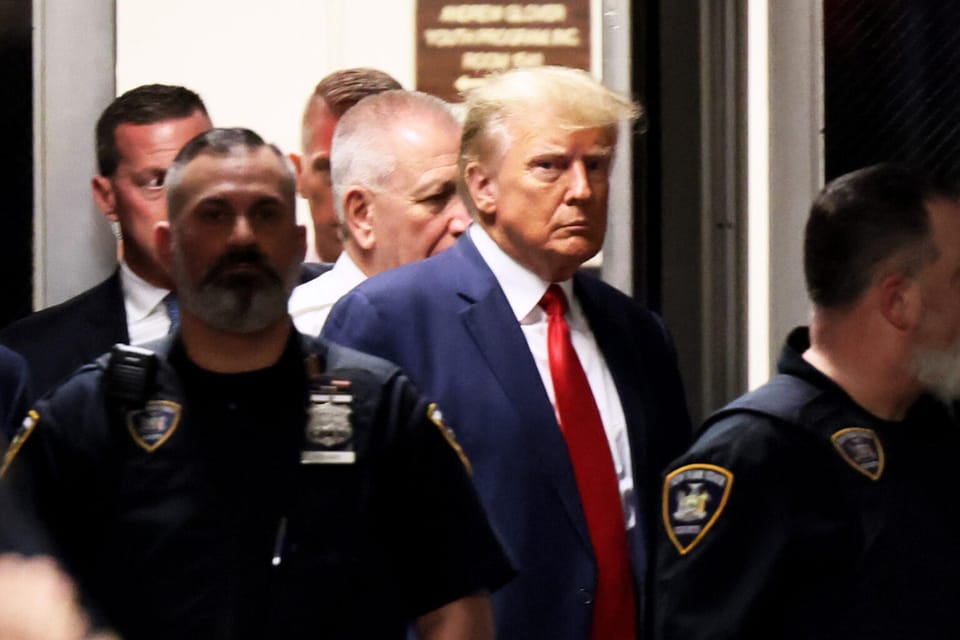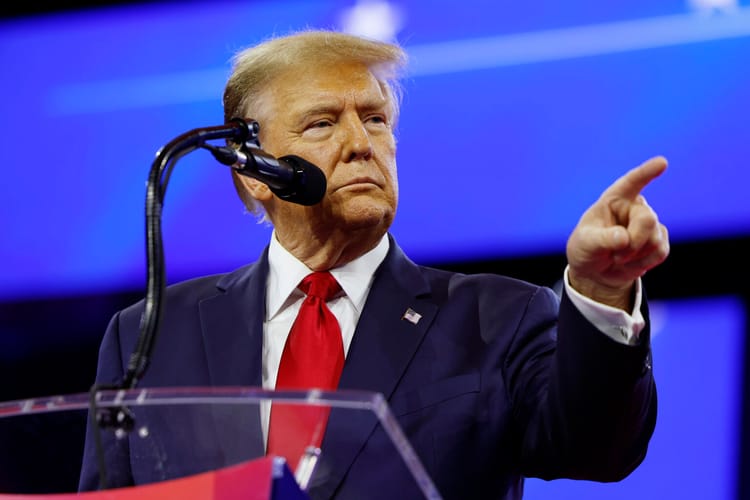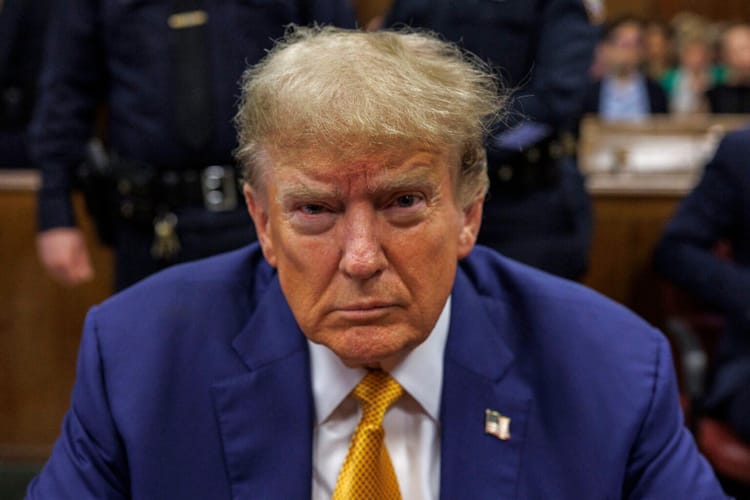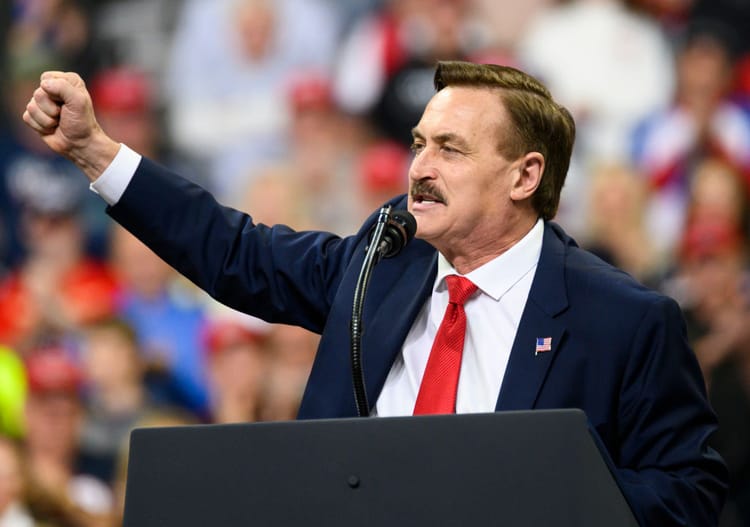Trump’s repeated escapes from political damage to be tested in NYC trial

By Jacob Fischler, Minnesota Reformer
Donald Trump on Monday in a New York City courtroom will make history as the first former U.S. president to stand trial in criminal proceedings.
And it raises new issues for the presumptive Republican nominee for president in November, even as he builds a political brand that so far has seemed immune from accusations of wrongdoing.
Trump is accused of falsifying business records to cover up payments made during his first White House run in 2016 to the adult film star Stormy Daniels in return for her silence about an alleged affair.
It’s a somewhat complicated, documents-based case in which prosecutors must convince jurors that bookkeeping errors were committed with the aim of illegally affecting an election, Jessica A. Levinson, the director of the Public Service Institute at Loyola Marymount University’s law school, said in an interview.
And though some experts consider it an election interference case, it’s neither the most serious allegation Trump faces nor the easiest for prosecutors to prove, Levinson said.
“This case is being asked to bear more weight than it possibly should or could,” Levinson said. “It’s being asked to be a bellwether, a referendum on Trump. And it’s a state criminal case. It’s not more, it’s not less, but the amount of attention it’s getting is obviously outsized.
“For people who feel like Trump should be held to account, now all eyes are on this one business records case,” she added. “When you think about the things that were most harmful to our democracy, arguably this isn’t the case that should have gone first.”
The outcome of the trial could affect voters’ perceptions of the other prosecutions, Levinson said.
The case is one of four against Trump involving criminal charges, two in state courts and two in federal courts. A state prosecution in Georgia accuses him of conspiring to overturn that state’s election results.
The two cases in the federal courts include a federal charge related to Trump’s efforts to overturn his loss in the 2020 presidential election that culminated in the Jan. 6, 2021, attack on the U.S. Capitol, and another federal case charging Trump with improperly storing classified documents after he left office.
Election interference?
Norm Eisen, a legal analyst who was Democratic co-counsel for the U.S. House Judiciary Committee during Trump’s first impeachment on charges he solicited election interference from Ukraine during the 2016 election, said the New York state case should also be considered an election interference case.
Levinson, an expert on the law of the political process, including campaign finance law, agreed, though she said the allegations are not at the same level as charges related to attempts to overturn the 2020 election results.
The payments to Daniels were meant to disrupt the 2016 election by withholding key information from voters, she said. They began shortly after video footage surfaced of Trump bragging about grabbing women’s genitals.
Prosecutors say allegations of infidelity with a porn actor would have further eroded Trump’s support with women voters and the payments were meant to stop that.
The allegations in the case are violations of election law and campaign finance law, Levinson noted.
“It’s not the same as ‘I don’t want you to count up Electoral College votes,’” she said, referring to the charges in other election interference cases. But “it is about, in my view, trying to hide a story from the voters right after they had just heard the ‘Access Hollywood’ tape and right before they were going to the ballot box.”
Trump has consistently characterized the case, as he has with all the criminal charges against him, as a political witch hunt by Democrats to undermine a political rival.
In a fundraising appeal Friday, Trump repeated the message.
“ON MONDAY ALL HELL BREAKS LOOSE!” the email said. “BIDEN AND HIS ALLIES WANT ME LOCKED AWAY IN PRISON! RABID DEMOCRATS ARE POISED TO RAISE MILLIONS WHILE I’M STUCK DEFENDING MYSELF IN COURT!”
That critique ignores the high standard of evidence needed to bring criminal charges, and doesn’t refute the allegations, but that type of all-caps accusation has proved effective at keeping many Republican voters supportive of Trump.
Spokespeople for the Trump campaign did not return messages seeking comment for this story.
In the courtroom
The trial will start Monday with jury selection, which could last several days or longer.
Once the actual arguments begin, the case will hinge on Manhattan District Attorney Alvin Bragg’s ability to show jurors that the irregularities in Trump’s business records were in service of committing another crime.
Paying hush money is not illegal by itself, Levinson said, so the violation of campaign finance law is crucial to the case.
Bragg and his team should try to simplify the case and “emphasize over and over again” that the payments were meant to influence the election, she said.
Trump’s defense will likely focus on Michael Cohen, the former vice president of the Trump Organization and Trump’s onetime personal counsel who allegedly delivered the payments to Daniels.
Cohen, who served a federal prison sentence for tax fraud and perjury, has publicly described Trump’s role in the alleged scheme. But his credibility, after his convictions and the public reversal of his account, is a major question.
Electoral impact of conviction unclear
For more than eight years, Trump has successfully deflected and even used to his advantage the types of scandals that were previously believed to be fatal to political candidates, disproving predictions of an imminent political collapse so regularly it became a cliche.
He has so far weathered any significant damage from the criminal proceedings, including the New York case, and even gained some political benefit from them.
He has said the prosecutions are politically motivated attempts by Democrats to weaken their chief political opponent. Republican voters, at least, seem to largely accept that argument, allowing Trump to coast to the nomination early this year.
And the criminal allegations have not yet critically damaged Trump’s reputation with general election voters. He is polling close to President Joe Biden in several swing states and in national surveys, though voters have told pollsters that their opinions may change if Trump is convicted.
But there is reason to doubt that a conviction would have any impact on Trump’s position with voters, Seth Masket, the director of the Center on American Politics at the University of Denver, said in an interview with States Newsroom.
Political observers wondered throughout 2023 how much the four criminal indictments against Trump would affect the former president in the 2024 primaries, Masket said.
The accusations, especially the New York charges that were the first to be revealed, seemed to actually help in the nominating race. His rivals in that contest largely defended Trump.
Even if he’s convicted, Republican voters in a polarized country are more likely to side with Trump than a judicial system he describes daily as corrupt, Masket said.
“Everything we’ve seen so far suggests that every bad thing that happens to him causes Republicans to rally behind him and ratify his view that the system is after him,” he said. “The idea that a conviction would be perceived broadly enough across parties as completely legitimate and aboveboard I think is pretty unlikely.”
Eisen, who said he expects Trump to be convicted in the New York case, disagrees, saying the spectacle of a criminal conviction would break Trump’s hold on voters.
“When a jury of Trump’s peers — and their peers, ordinary Americans — sit in judgment and reach a verdict, if they do, that’s a different order of magnitude,” Eisen said. “And then when you combine that with a criminal sentence following that kind of verdict, well then you really are in a whole different ballgame.”
Beyond the first trial
But if Trump is not convicted, or if the charges are reduced to misdemeanors, it could insulate him in voters’ minds against the other pending cases, Levinson said.
Because Trump has for years described the legal actions against him as political, winning the first case to reach court could help reinforce that message, she said.
“If he’s anything short of convicted on the felonies, then it’s just a huge win for him because he’s going to take this to say, ‘Look, every legal action against me is baseless,’” Levinson said. “I don’t think it has anything to do legally with the other cases. But it will be politically a huge win for the former president.”
It’s unclear what the historical import of the first trial of a former president will be, Masket said. But the concept that Trump remains a viable presidential contender — and therefore somewhat immune from criminal accountability — is a troubling sign for U.S. democracy.
“We repeatedly get this message that no one is above the law, except maybe this one guy,” Masket said. “And that’s a problem. That just undermines a lot of people’s faith in the democratic system.”
Minnesota Reformer is part of States Newsroom, a nonprofit news network supported by grants and a coalition of donors as a 501c(3) public charity. Minnesota Reformer maintains editorial independence. Contact Editor J. Patrick Coolican for questions: info@minnesotareformer.com. Follow Minnesota Reformer on Facebook and Twitter.





Member discussion